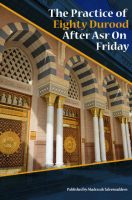عن أبي طلحة الأنصاري رضي الله عنه قال أصبح رسول الله صلى الله عليه وسلم يوما طيب النفس يرى في وجهه البشر قالوا يا رسول الله أصبحت اليوم طيب النفس يرى في وجهك البشر قال أجل أتاني آت من ربي عز وجل فقال من صلى عليك من أمتك صلاة كتب الله له عشر حسنات ومحا عنه عشر سيئات ورفع له عشر درجات ورد عليه مثلها (سنن النسائى، الرقم: 1283، ورجاله موثقون كما في القول البديع صـ 248)
Hazrat Abu Talhah (radhiyallahu ‘anhu) relates: One morning, Nabi (sallallahu ‘alaihi wasallam) came to us in a state of happiness, to such an extent that the joy and happiness beamed from his blessed countenance. The Sahabaah (radhiyallahu ‘anhum) enquired, “O Rasulullah (sallallahu ‘alaihi wasallam), we notice that you are very pleased today. The happiness can be clearly seen on your blessed face.” Rasulullah (sallallahu ‘alaihi wasallam) replied, “Yes indeed, a messenger came to me from my Lord with the following message, ‘Whosoever from amongst your Ummah recites Durood upon you once, Allah Ta‘ala will record for him ten righteous deeds, erase and pardon ten sins, raise his rank in Jannah by ten stages and reply to his Durood in a similar manner (i.e. Allah Ta‘ala will send ten mercies and blessings upon him).’”
Adding ‘wasallam’ in the Durood
Hazrat Ebrahim Nasafi (rahimahullah) relates:
On one occasion, I had seen Rasulullah (sallallahu ‘alaihi wasallam) in a dream. In the dream, I was unsure as to whether he was displeased with me. I stretched forth my hand, took hold of the hands of Rasulullah (sallallahu ‘alaihi wasallam) and kissed them.
I asked in great anxiety, “O Rasulullah (sallallahu ‘alaihi wasallam), I am indeed one of the servants of Hadith. I belong to the Ahlus Sunnah (those who follow your way) and I am a traveller from afar. Have compassion on me. Have I displeased you?” Rasulullah (sallallahu ‘alaihi wasallam) smiled and said, “Whenever you recite Salaat, why do you not recite Salaam?” Thereafter, it became a fixed habit of mine to recite ‘wasallam’ as well. (Al-Qowlul Badee’ Pg. 488)
 Ihyaaud Deen An Effort to Revive Deen in Totality
Ihyaaud Deen An Effort to Revive Deen in Totality




